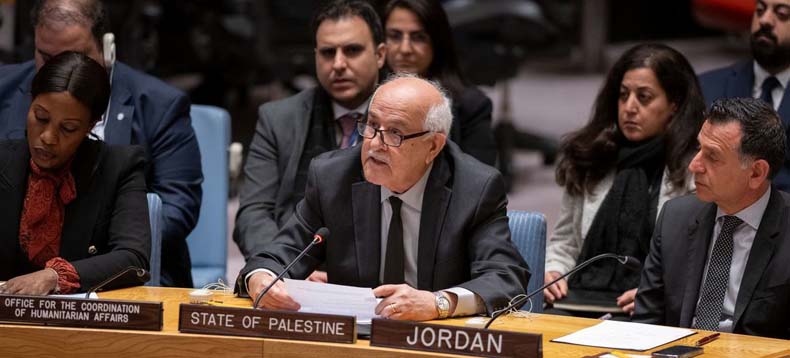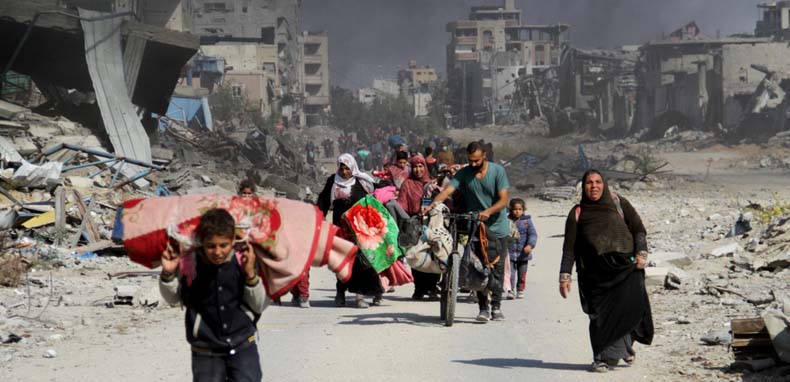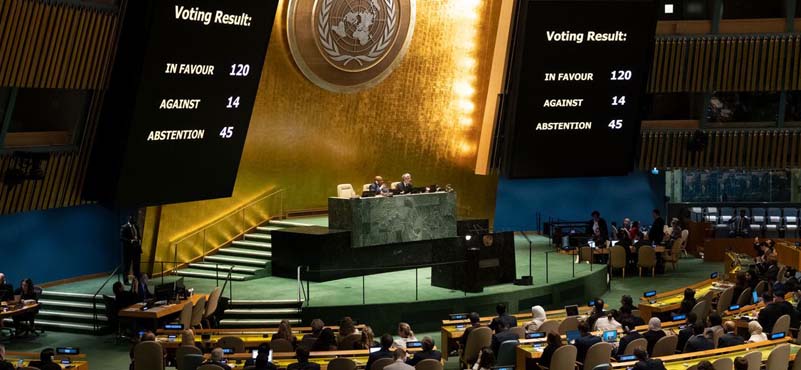There was tragic irony in the fact that the day Israel launched its ground assault on Gaza city two days ago, a United Nations Commission of Inquiry Report was released which confirms that Israel has committed genocide against Palestinians in Gaza. The new report, described as the strongest and most authoritative UN finding to date, says there are reasonable grounds to conclude that four of the five genocidal acts defined under international law have been carried out since the start of the war with Hamas in 2023: killing members of a group, causing them serious bodily and mental harm, deliberately inflicting conditions calculated to destroy the group, and preventing births. It cites statements by Israeli leaders, and the pattern of conduct by Israeli forces, as evidence of genocidal intent.
The Independent International Commission of Inquiry on the Occupied Palestinian Territory was established by the UN Human Rights Council in 2021 to investigate all alleged violations of international humanitarian and human rights law. The three-member expert panel is chaired by Navi Pillay, a South African former UN Human Rights chief who was president of the International Tribunal on Rwanda’s genocide. The two other members are Chris Sidoti, an Australian human rights lawyer, and Miloon Kothari, an Indian expert on housing and land rights.

The commission said its latest report was “the strongest and most authoritative UN finding to date” on the war. However, it does not officially speak for the UN. The 72-page document alleges that Israeli authorities and Israeli security forces have committed and are continuing to commit four of the five acts of genocide defined under the 1948 Genocide Convention against a national, ethnic, racial or religious group – in this case, Palestinians in Gaza:
- Killing members of the group through attacks on protected objects; targeting civilians and other protected persons; and the deliberate infliction of conditions causing deaths
- Causing serious bodily or mental harm to members of the group through direct attacks on civilians and protected objects; severe mistreatment of detainees; forced displacement; and environmental destruction
- Deliberately inflicting conditions of life calculated to bring about the destruction of the group in whole or in part through destruction of structures and land essential to Palestinians; destruction and denial of access to medical services; forced displacement; blocking essential aid, water, electricity and fuel from reaching Palestinians; reproductive violence; and specific conditions impacting children
- Imposing measures intended to prevent births through the December 2023 attack on Gaza’s largest fertility clinic, reportedly destroying around 4,000 embryos and 1,000 sperm samples and unfertilised eggs.
To fulfil the legal definition of genocide under the Genocide Convention, it must also be established that the perpetrator committed any one of those acts with specific intent to destroy the group in whole or in part.
Pillay said: “It took us two years to gather all the actions and make factual findings, verify whether that had happened… It’s only the facts that will direct you. And you can only bring it under the Genocide Convention if those acts were done with this intention.” The commission says the acts of Israeli political and military leaders are “attributable to the State of Israel”, and that the state therefore “bears responsibility for the failure to prevent genocide, the commission of genocide and the failure to punish genocide”. A number of international and Israeli human rights organisations, independent UN experts, and scholars have also accused Israel of genocide against Palestinians in Gaza.

The UN says it cannot make a legal determination as to whether a situation constitutes genocide under international law. It says a situation is referred to as genocide only after a competent national or international court has declared it as such. The International Court of Justice (ICJ) is currently hearing a case brought by South Africa that accuses Israeli forces of genocide, but it could take years to reach a conclusion.
In establishing the genocidal acts, the Commission examined the Israeli military operations in Gaza, including killing and seriously harming unprecedented numbers of Palestinians; imposing a total siege, including blocking humanitarian aid leading to starvation; systematically destroying the healthcare and education systems in Gaza; committing systematic acts of sexual and gender based violence; directly targeting children; carrying out systematic and widespread attacks on religious and cultural sites; and disregarding the orders of the International Court of Justice. The Commission applied the “only reasonable inference” standard set forth by the International Court of Justice in the case of Bosnia v. Serbia. The Commission analysed statements made by Israeli authorities and concluded that those statements are direct evidence of genocidal intent. The Commission also analysed the pattern of conduct of Israeli authorities and the Israeli security forces in Gaza, including imposing starvation and inhumane conditions of life for Palestinians in Gaza, and found that genocidal intent was the only reasonable inference that could be concluded from the nature of their operations.
“Israel has flagrantly disregarded the orders for provisional measures from the International Court of Justice and warnings from Member States, UN offices, human rights organisations and civil society groups, and continued the strategy of destruction of the Palestinians in Gaza,” said Pillay. “The Commission finds that the Israeli authorities had no intention to change their course of actions. On the contrary, Israeli authorities have persisted and continued with their genocidal campaign in Gaza for almost two years now. Israel must immediately end the genocide in Gaza and comply fully with the orders for provisional measures of the International Court of Justice,” she added.
The Commission also concluded that Israeli President Isaac Herzog, Prime Minister Benjamin Netanyahu and then Defence Minister Yoav Gallant, have incited the commission of genocide and that Israeli authorities have failed to take action against them to punish this incitement. The Commission has not fully assessed statements by other Israeli political and military leaders and considers that they too should be assessed to determine whether they constitute incitement to commit genocide.
The Commission urges the Government of Israel to end its strategy of starvation, lift the siege and facilitate and ensure the unimpeded access of humanitarian aid at scale and unhindered access of all United Nations staff, including UNRWA and OHCHR international staff, and all recognized international humanitarian agencies delivering and coordinating aid. The Commission calls on Israel to immediately end the activities of the Gaza Humanitarian Foundation.
The Commission recommended that Member States cease the transfer of arms and other equipment that may be used for the commission of genocidal acts to Israel; ensure individuals and corporations in their territories and within their jurisdiction are not involved in aiding and assisting the commission of genocide or incitement to commit genocide; and take action on accountability through investigations and legal proceedings against individuals or corporations that are involved in the genocide directly or indirectly.
“The international community cannot stay silent on the genocidal campaign launched by Israel against the Palestinian people in Gaza. When clear signs and evidence of genocide emerge, the absence of action to stop it amounts to complicity,” said Pillay. “Every day of inaction costs lives and erodes the credibility of the international community. All States are under a legal obligation to use all means that are reasonably available to them to stop the genocide in Gaza,” she added.
While neither the commission nor the 47-member council it reports to can take direct action against any country, their findings can be used by prosecutors at the International Criminal Court or the International Court of Justice. The International Criminal Court has arrest warrants outstanding for Benjamin Netanyahu, the Prime Minister of Israel, and former defence minister Yoav Gallant. They both face charges of war crimes and crimes against humanity over Israel’s campaign in Gaza, including starvation, murder and persecution. The ICC has not charged either man with genocide. The court also issued warrants for three senior Hamas leaders, all since withdrawn after their deaths. In the case of the International Criminal Court, it is currently examining an Israeli challenge to its jurisdiction.
The court relies on its 125 member states to enforce its arrest warrants, meaning that unless Israel decides to hand over Netanyahu to The Hague, he is unlikely to appear in the dock. The ICC cannot hold a trial in absentia. The International Court of Justice has given Israel until January 2026 to file in writing a so-called “counter memorial” responding to South Africa’s case. Following that, there is likely to be more legal back-and-forth as the court weighs probable objections by both sides. That process could take another year at least, by which time, under Israel’s latest ground offensive in Gaza city, the charges of genocide could only get more forceful.
ABOUT THE AUTHOR
 Dilip Bobb is a former senior managing editor, India Today (1975 -2010), and Group Editor, Features and Special Projects, Indian Express (February 2011-October 2014)
Dilip Bobb is a former senior managing editor, India Today (1975 -2010), and Group Editor, Features and Special Projects, Indian Express (February 2011-October 2014)








